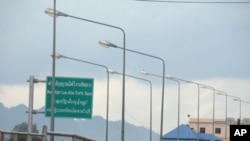Burma will hold national elections, the first in 20 years, on November 7. The elections are controversial because the military has ruled the country for decades and the last election, in 1990, won by Aung San Suu Kyi's National League for Democracy was not allowed to take their parliamentary seats and the election was disavowed. This time, there are some signs that things have changed, but not by a lot. Many of the military leaders and their supporters are now running as civilians for nearly all the parliamentary seats. Still, there are signs that some of the opposition parties may win seats in legislature.
As Election Day nears, Internet connections in Burma have been disrupted at times for the past week, slowing communications with the outside world. The ruling military offered no explanation for the Internet failure, unlike during past outages. This has prompted human rights groups to speculate that the connections were deliberately shut down to slow the flow of information out of Burma ahead of Election Day.
David Steinberg, a professor at the School of Foreign Service at Georgetown University in Washington, D.C. is a specialist on Burma.
The Burmese military government says these elections will allow the political opposition to have a voice in parliament for the first time in decades. Do you think that will happen?
Oh! Yes, I think it will happen, but it's far more significant than just in 20 years. This will be the first time in 50 years that there will be, I believe, some opposition voices in parliament. So, it is far more significant than the last election in 1990 which was, of course, ignored by the government.
Further, there's another aspect to this. This is also the first time in all of Burma's history where we have what we could call state or provincial legislatures that will have some local authority. And, there will be 14 of them in addition to the national bicameral legislature. So, this is an innovation that we don't know how it's going to work.
Still, the military, quite clearly, will not lose control, that is evident.
Some are calling this election little more than a sham. Is it?
I think that is unfair. It is an election where the military will continue to have control that has been evident, forever, almost. But, it is not a sham because there will be some opposition, I believe. The minorities will have an extended role in these provincial legislatures. That's likely to be important but we don't know what's going to develop.
One of the critical issues, of course, is after the elections, after these parliaments are in place, whether their debates or discussion can be available in the media. What will they do with the censorship law? That's one of the critical issues that have to be addressed.
Well, it is one of the problems because they have barred outside reporters and diplomats from visiting Burma to observe the election. So, is there any guarantee this election will be free and fair?
There are two things to think about, or maybe three. One is, have the campaigning and the election laws been fair? The answer is no. Will the vote counting be fair? We don't know because in 1990 with government control (of the election) the campaigning was clearly unfair but the vote counting was fair, otherwise how could the opposition win 80% of the seats? So, we don't know what's going to happen on that.
It's somewhat different than has been represented. I don't think it is a sham, but it is controlled. The diplomats who are resident in the country will be allowed to observe certain restricted places. But, they won't have free access. And, certainly, visas have been denied to people, some I know wanted to go. So, yes, they are keeping a lid on it, there's no doubt about that.




